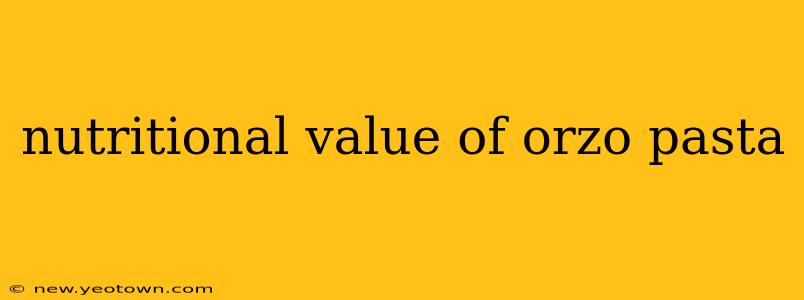Orzo, that tiny, rice-shaped pasta, often graces our plates as a side dish or a component in a vibrant salad. But beyond its delightful texture and versatility, lies a nutritional profile worth exploring. This isn't just about calories; it's about understanding how orzo fits into a balanced diet and what makes it a valuable (or less valuable) addition to your culinary repertoire.
What is Orzo Pasta Made Of?
Before diving into the nutritional breakdown, let's understand orzo's foundation. It's essentially a small pasta, traditionally made from durum wheat semolina. This gives it a slightly firmer texture compared to other pasta varieties. However, you can now find orzo made from other grains like brown rice or even gluten-free blends, significantly altering its nutritional makeup. Understanding the ingredients is the first step in comprehending its nutritional value.
What are the Nutritional Benefits of Orzo?
Orzo, particularly when made from durum wheat, offers a decent source of carbohydrates, providing energy for your daily activities. It's also a moderate source of fiber, which aids in digestion and contributes to feelings of fullness. Additionally, it contains small amounts of protein and some essential minerals like iron and magnesium. The exact amounts depend, however, on the type of orzo (wheat-based versus alternative grains) and the cooking method.
How Many Calories are in Orzo?
The calorie count of orzo varies based on the type and serving size. A typical one-cup serving of cooked orzo pasta made from durum wheat generally contains around 200-230 calories. However, remember that adding sauces, cheese, or other ingredients will significantly increase the overall calorie count. This is a crucial point to consider when planning your meals and aiming for a balanced caloric intake.
Is Orzo Gluten-Free?
No, traditional orzo is not gluten-free. As mentioned earlier, it's primarily made from durum wheat semolina, a gluten-containing grain. However, the market offers gluten-free alternatives made from rice, corn, or other gluten-free grains. If you have celiac disease or a gluten sensitivity, always check the label carefully to ensure you're purchasing a gluten-free variety.
How Does Orzo Compare to Other Pastas?
Compared to other pasta types, orzo falls into a similar nutritional range. The differences are subtle, often determined by the type of flour used and the shape of the pasta. For example, whole wheat orzo will offer a higher fiber content than orzo made from refined wheat. Ultimately, the choice of pasta often comes down to personal preference and dietary needs.
What are the Potential Downsides of Eating Orzo?
While orzo offers nutritional benefits, it's essential to be mindful of potential downsides. Firstly, its carbohydrate content can be a concern for individuals managing blood sugar levels. Secondly, the glycemic index of orzo can be relatively high, leading to a rapid spike in blood sugar. Thirdly, consuming large quantities of refined-wheat orzo could contribute to weight gain if not balanced with sufficient physical activity and a generally healthy diet.
How Can I Incorporate Orzo into a Healthy Diet?
Orzo’s versatility makes it a great addition to a healthy diet. You can incorporate it into various dishes:
- Salads: Orzo adds a satisfying chewiness to salads, offering a textural contrast to fresh vegetables and proteins.
- Soups: It can thicken soups and add heartiness, providing a substantial meal.
- Stuffed vegetables: Orzo can be used as a filling in bell peppers, zucchini, or squash.
- Pasta salads: It's an excellent base for Mediterranean-style pasta salads.
Remember portion control and choosing whole-grain orzo whenever possible to maximize nutritional benefits and minimize potential drawbacks.
In conclusion, orzo pasta offers a moderate source of carbohydrates, fiber, and some essential nutrients. However, its nutritional value is largely dependent on the ingredients and cooking method. Always be mindful of serving sizes and choose varieties that align with your dietary needs and health goals. Enjoy this versatile little pasta as part of a balanced and delicious diet.

